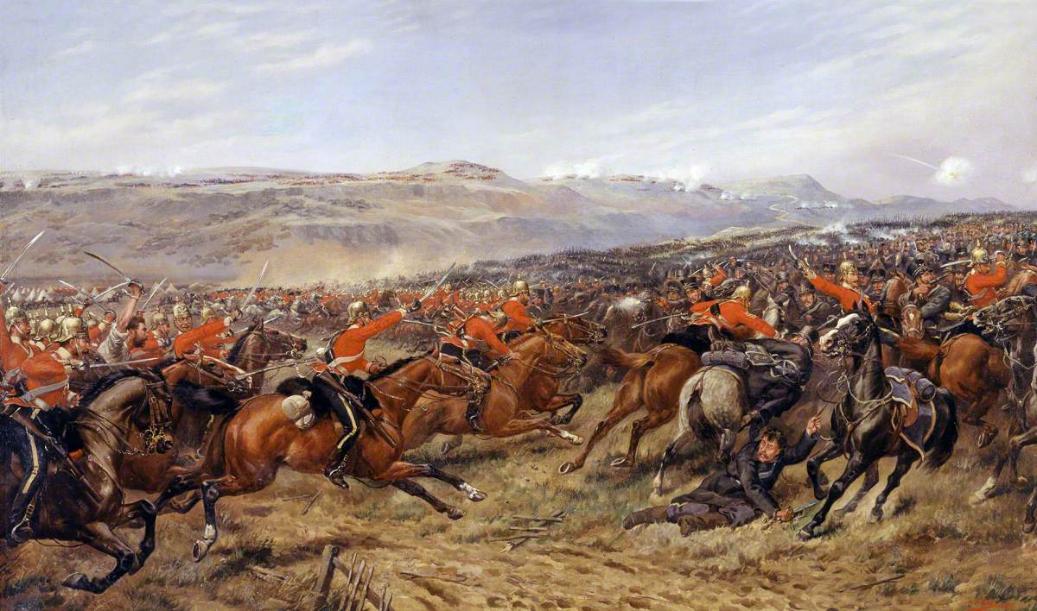THE CHARGE OF THE HEAVY BRIGADE – TENNYSON’S OTHER POEM ABOUT THE CRIMEAN WAR
It’s often said that the British prefer to celebrate their defeats more than their victories and whilst this may be something of a myth it’s certainly true of The Crimean War and The Charge of the Light Brigade. The disastrous ‘ride of the 600 into the Valley of Death’ is regularly trumpeted as the best (or maybe that should read the worst) example of incompetence in British military history but this action was only one small part of what was (eventually) the British victory at the Battle of Balaklava [1854].
Apart from the heroic defence of the British base by the 93rd Highlanders, which is the origin of the phrase ‘The Thin Red Line’, General Sir James Scarlett led the 300 horsemen of his Heavy Brigade against a much larger Russian force and successfully routed them. Like the Earl of Cardigan’s arrogance and blunder, Scarlett’s courage and initiative was immortalised in verse by Alfred Lord Tennyson and whilst his second poem may lack the dramatic imperative of The Charge of the Light Brigade, The Charge of the Heavy Brigade deserves to be better known…
The Charge Of The Heavy Brigade At Balaclava - October 25th, 1854
I.
The charge of the gallant three hundred, the Heavy Brigade!
Down the hill, down the hill, thousands of Russians,
Thousands of horsemen, drew to the valley–and stay’d;
For Scarlett and Scarlett’s three hundred were riding by
When the points of the Russian lances arose in the sky;
And he call’d, ‘Left wheel into line!’ and they wheel’d and obey’d.
Then he look’d at the host that had halted he knew not why,
And he turn’d half round, and he bade his trumpeter sound
To the charge, and he rode on ahead, as he waved his blade
To the gallant three hundred whose glory will never die–
‘Follow,’ and up the hill, up the hill, up the hill,
Follow’d the Heavy Brigade.
II.
The trumpet, the gallop, the charge, and the might of the fight!
Thousands of horsemen had gather’d there on the height,
With a wing push’d out to the left and a wing to the right,
And who shall escape if they close? but he dash’d up alone
Thro’ the great gray slope of men,
Sway’d his sabre, and held his own
Like an Englishman there and then.
All in a moment follow’d with force
Three that were next in their fiery course,
Wedged themselves in between horse and horse,
Fought for their lives in the narrow gap they had made–
Four amid thousands! and up the hill, up the hill,
Gallop't the gallant three hundred, the Heavy Brigade.
III.
Fell like a cannon-shot,
Burst like a thunderbolt,
Crash’d like a hurricane,
Broke thro’ the mass from below,
Drove thro’ the midst of the foe,
Plunged up and down, to and fro,
Rode flashing blow upon blow,
Brave Inniskillens and Greys
Whirling their sabres in circles of light!
And some of us, all in amaze,
Who were held for a while from the fight,
And were only standing at gaze,
When the dark-muffled Russian crowd
Folded its wings from the left and the right,
And roll’d them around like a cloud,–
O, mad for the charge and the battle were we,
When our own good redcoats sank from sight,
Like drops of blood in a dark-gray sea,
And we turn’d to each other, whispering, all dismay’d,
‘Lost are the gallant three hundred of Scarlett’s Brigade!’
IV.
‘Lost one and all’ were the words
Mutter’d in our dismay;
But they rode like victors and lords
Thro’ the forest of lances and swords
In the heart of the Russian hordes,
They rode, or they stood at bay–
Struck with the sword-hand and slew,
Down with the bridle-hand drew
The foe from the saddle and threw
Underfoot there in the fray–
Ranged like a storm or stood like a rock
In the wave of a stormy day;
Till suddenly shock upon shock
Stagger’d the mass from without,
Drove it in wild disarray,
For our men gallopt up with a cheer and a shout,
And the foeman surged, and waver’d, and reel’d
Up the hill, up the hill, up the hill, out of the field,
And over the brow and away.
V.
Glory to each and to all, and the charge that they made!
Glory to all the three hundred, and all the Brigade!

The Charge of The Heavy Brigade by Godfrey Douglas Giles (1857–1941) now in the National Army Museum